Pillars of Eternity interview: on combat, companions and character building
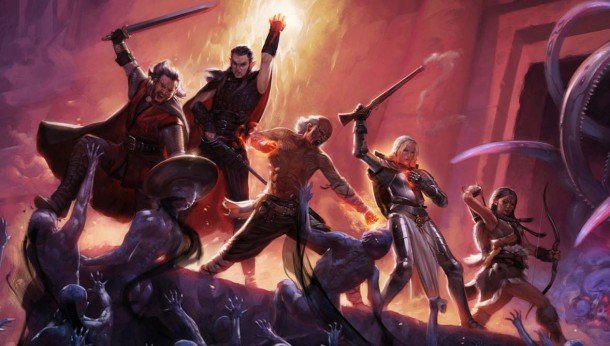
It's been over a year since Pillars of Eternity - formerly Project Eternity - raised nearly $4 million through its Kickstarter campaign. Despite being set in a brand new fiction and using a redesigned combat system, Obsidian's isometric RPG is heavily and unashamedly inspired by Dungeons & Dragons based Infinity Engine games like Baldur's Gate, Icewind Dale and Planescape: Torment.
With production now well underway, I spoke to the game's project director Josh Sawyer, formerly the lead designer of Icewind Dale 2, about Pillars of Eternity's combat, characters and setting, and how the team are moving beyond D&D.
PC Gamer: Were the new systems you've designed for Pillars of Eternity in any way responses to problems to you had creating the old Infinity Engine games?
Josh: Yeah, some of them were really fiddly sort of things. Dungeons and Dragons is based around the idea of people sitting around a table and doing basic arithmetic with a twenty-sided die. When you're on a computer a lot of those calculations can go a lot faster. You can do real-time division very easily, you can use a 100-point scale for things where normally that would be kind of onerous in a tabletop environment.
The thing that allows us to do is give finer granularity and do more complex calculations that scale better over the course of the game. Also things like combat rounds could be very limiting, so we're doing something else in the spirit of a fully real-time, continuous, purely time based system, while still feeling like you're controlling little RTS-type units. In the sense that you're not making guys do individual attacks, as much as assigning them actions and watching them go about them.
PC Gamer: In terms of combat: going back to the Infinity Engine games, one of the stranger sights is these two characters facing each other, swiping away with their swords and waiting for the dice rolls to hit. Is that a quirk you wanted to retain?
Josh: Well, we have eliminated the fake attacks, so that doesn't happen. We're not trying to have a super-high level of verisimilitude in the sense of having everyone attacking and parrying and stuff like that, because the characters are pretty small, and having all these weird creatures doing all these synchronised parries would actually be pretty difficult. Because we're not using rounds they can be active on more than just a once every six seconds basis. They're more continuously active and they have combat stances, which is something the Infinity Engine games did not have. They look a little more involved and engaged, but there still is a little hand waving there where they're pantomiming what they're doing.
Keep up to date with the most important stories and the best deals, as picked by the PC Gamer team.
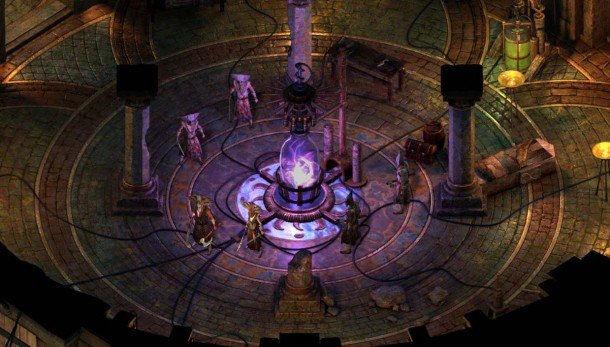
PC Gamer: Something you mentioned in the backer updates: a line about social and political complexities, which harks back to, for instance, Baldur's Gate 1 and the iron crisis. Is that something we're going to see a lot of in the game?
Josh: Yeah, definitely. It was important to us and, in the early times talking about this... ultimately we wanted the story to be personal. A lot of people have responded very well to very personal stories from games like Planescape: Torment or Neverwinter Nights 2: Mask of the Betrayer, which are very personal stories. But we also felt - I can say I certainly strongly felt - that the events that are going on should tie into larger world events. You should feel like your personal story is stepping into the larger story of the world, in that by resolving your personal conflict, you're also deciding how things are working out with these other groups as well.
That way it feels like you're having a bigger influence on the outside world, but the main story is still connected very directly to you. So yeah, political things, conflicts in the history, ancient history, recent history, the continuing clash of cultures are all going to be at the forefront, because that makes for interesting conflict and for interesting choices for the player to make.
PC Gamer: And will those conflicts will have an effect on your character, based on your customisation choices? For example, will NPCs have stronger reactions to you if you play as a Godlike character?
Josh: Yup. So the character you play, a lot of people will respond to you based on things like race. Also where you're from, because you'll pick a background - so what part of the world you're from that's not here. So those will sometimes open up options for you as a character in dialogue. Other times it will provoke a reaction from people.
Godlike are very distinctive in appearance. Looking at them right away, you can tell that they're not human. So some people will react more like with amazement than anything: some people think Godlike are just fantastic and incredible. Other people are very prejudiced against them, very suspicious of them, or are just uneasy about it. Then you have a race like the Orlans, who are a new race we've made for Project Eternity. And Orlans, in this part of the world, many people view very poorly, because Orlans from a neighbouring culture were involved in a lot of atrocities, and so there's a lot of deep seated prejudice against them as being these bloodthirsty, murderous savages.
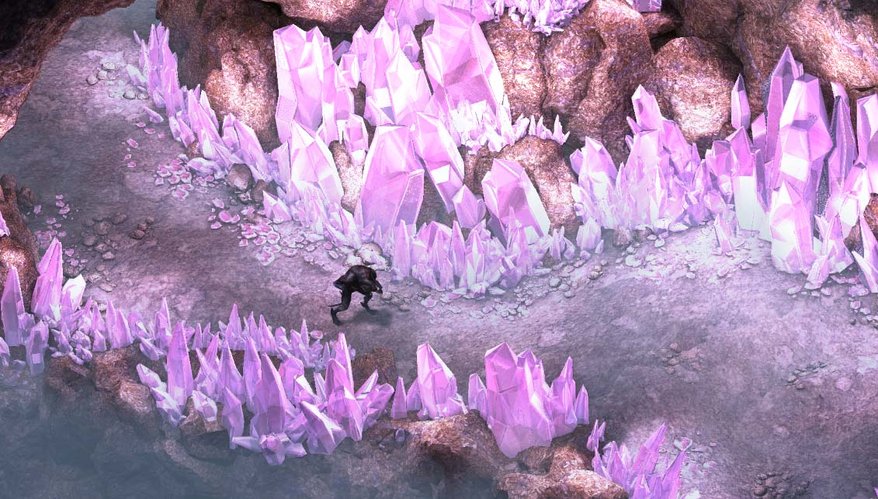
PC Gamer: Moving on to the companions, it sounds like you've got a mix of companions that have been written and have their own quests and motivations, and also space for characters that the player creates themselves. It's like the Icewind Dale structure meets the Baldur's Gate structure. How does that work?
Josh: One thing that we're trying to avoid - we believe mostly for the benefit of the player when they first come into the game - you can't just create six characters from the beginning. You create your main central character, and then there are places throughout the game where you can effectively hire more adventurers. And if you hire more adventurers, you're actually making more characters, but it does cost money to get those guys.
Once you have them, they're yours and you can use them and switch them in and out. But in that way, if the player has something very specific in mind, they can build whatever party they want. Also we know that with companions, no matter how well we design them, if 80% of people like that character - they love that character - there's gonna be 20% of people who say "I really want to have a Paladin, but I don't want that character. I can't stand that character."
For those players, it would be kind of bad if they didn't have the opportunity to generate their own Paladin. They obviously don't have the personality of the other character, but that was the thing they were trying to avoid anyway. Or maybe they want two Paladins, or three Paladins, or maybe they want a party of wizards. It gives them the ability to do that. But we are trying to make sure that happens while the player is being introduced around the same time to the companions, because we're going to put a lot of the traditional story stuff into the companions, as it was with the Baldur's Gate games.
PC Gamer: So you don't necessarily expect people to go fully down one route or the other, you think their might be trade-offs, where a character doesn't suit what people want to do?
Josh: I think the most common thing is that we're going to have parties of people that are made up of the main player character, three or four companions, and then a couple of characters that the player generated because they just wanted to someone to fit a slot that the other characters didn't do for them, mechanically or personality wise.
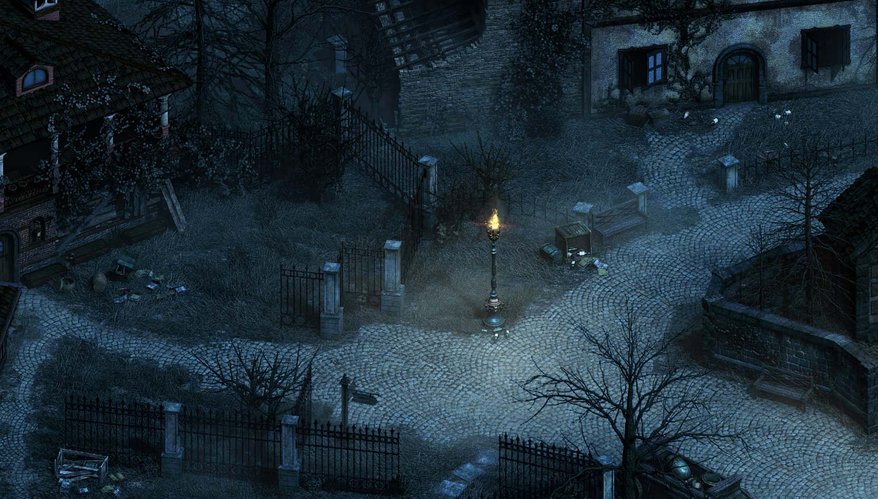
PC Gamer: A lot of the classes sound traditional in the roles that they fill, but also very flexible in the paths that you can take them down - like the Monk wearing armour. Does that make the class balance more even?
Josh: That certainly is our goal. I think, just as a general design philosophy, what I like to start out doing is I like to start out with everyone being equal with things, and then start pushing them apart until their differences feel good. We started out with this assumption: assume wizards can wear armour, and that's fine. Assume monks can wear armour. How does that change how you conceive of the power and the abilities of those characters. Also, what advantages would a character have if they stuck to that role. So for example, if you play a wizard and you stick to the traditional role, in our game you cast spells faster, because you take actions faster when you're not wearing armour.
Monks actually use a resource called 'wounds' to power their mystical abilities. They have a bunch of default abilities they can use and go buck wild, but their special abilities are achieved through collecting and expending wounds, where you only get wounds from taking damage. If you wear armour, you are better protected, but it is slowing the rate at which you accrue those wounds. So if you want to play a guy who uses a lot of his mystical abilities over time as a monk, don't wear armour and you're going to rack up wounds really quickly and you can just go wild with it. If you want to play a monk that balances the output of your mystical abilities with the ability to last longer in combat, then wear armour.
That's kind of the approach that I've taken to those things, is to say "you can do this stuff. All this stuff is valid and it works.
PC Gamer: One of the things, and I'm just speaking anecdotally from my experience with the older Infinity Engine games, I would tend to roll fighters or paladins or the guys with heavy armour, just because it made combat easier while you were weaker and levelling up. Would the flexibility of this system make it more viable to go for what is traditionally seen as a harder or weaker path.
Josh: Yeah, one thing that's a little difficult with wizards is that they are still a little fragile. But they have a lot of spells that they can cast right away, and they don't get the traditional D&D exhaustion after five minutes, like "welp, I'm done doing fun things in combat."
Character classes like fighters, they start out solid and they have a steady progression, for us though it's more like certain classes are more high maintenance than others. So, for example, a fighter is more low maintenance. They do not have a ton of active use abilities. They're reliable and consistent, and a lot of their abilities are designed around being reliable and consistent and lasting a long time.
Characters like wizards, monks or rogues are much higher maintenance, and you're expected to be doing a lot more micromanaging with them, but they both should feel like they're viable. If you went out with a group of wizards, you should not feel like "well, these guys are just going to stink for the first five levels." No, they're going to be pretty good, and they're going to have drawbacks like any class. It should feel like a different experience, but not dramatically more or less challenging to any other group of characters.
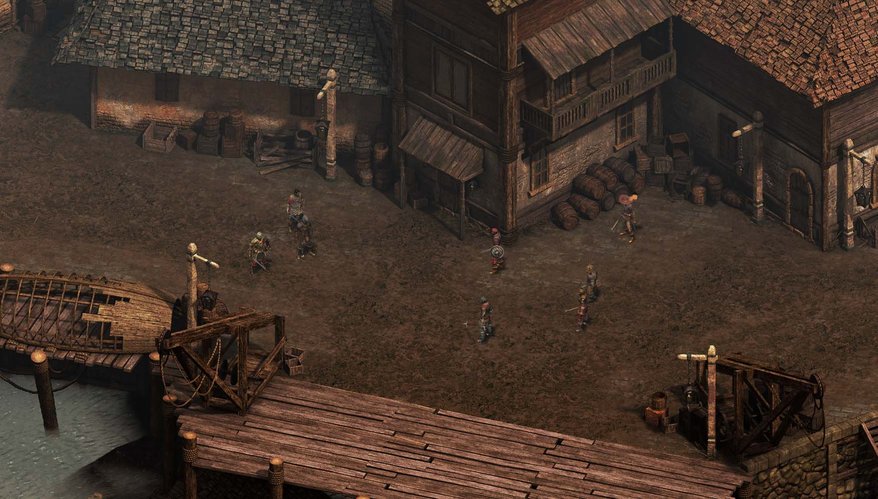
PC Gamer: You've also talked about non-combat skills. Reading about those, it almost sounds like you'd be able to avoid combat in certain situations. How viable a path is that?
Josh: It's not something we're specifically designing for. We're not designing for a zero kill run, or anything like that. But you can use stealth to sneak around a lot of fights.
You can also talk your way through certain fights. You can use your skills in certain situations to circumvent heavily guarded entrances and things like that. We want to allow you - when you want to - to avoid combat, but we're not specifically going out of our way to make pacifist playthroughs. Since tactical combat is a big focus of our game, we didn't want to box ourselves in to always allowing the player to talk or sneak their way through everything. But it does come up where you have that opportunity.
PC Gamer: I've been playing BG2 recently, and one of the things it reminded me of was that a lot of those games could be really weird at times, with a funny edge to certain quests. Is there a desire to recapture that spirit as well?
Josh: We don't want to kill the player's immersion or anything like that, but we also don't want to make this the world of seriousness all the time. We do try to use strange events and characters; very distinctive and memorable stuff so that when you're going through the world - especially a big city like Defiance Bay, which is our first big city - you feel like it is diverse, and has a lot of memorable characters in it and funny moments and goofy things that you get into. Yeah, I think we'll stop short of a bunch of pop culture references and stuff like that. We want the world to feel serious, but if a world and a story doesn't have moments of levity and silliness in it, it just becomes oppressive, and that's not really what we're going for.
PC Gamer: Thanks for your time.

Phil has been writing for PC Gamer for nearly a decade, starting out as a freelance writer covering everything from free games to MMOs. He eventually joined full-time as a news writer, before moving to the magazine to review immersive sims, RPGs and Hitman games. Now he leads PC Gamer's UK team, but still sometimes finds the time to write about his ongoing obsessions with Destiny 2, GTA Online and Apex Legends. When he's not levelling up battle passes, he's checking out the latest tactics game or dipping back into Guild Wars 2. He's largely responsible for the whole Tub Geralt thing, but still isn't sorry.

